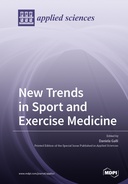Explore

New Trends in Sport and Exercise Medicine
0 Ungluers have
Faved this Work
Login to Fave
The practice of regular physical activity has been proposed as a determinant in many disciplines, from wellness to physiotherapy; in fact, it reduces the risks of cardiovascular diseases and diabetes. Moreover, physical exercise decreases the incidence of some types of cancer, such as breast and colon cancer. Finally, rehabilitation protocols need correct exercise training to reach the complete “return to play” of patients. Unfortunately, the mechanisms associated with the beneficial effects of physical activity are still under study. Therefore, advances in all aspects of sport and exercise medicine will be relevant for physicians, recreational sport practitioners and elite athletes. This was the aim of this Special Issue, “New trends in sport and exercise medicine”, which achieved great success. Sixteen papers have been published, which are briefly described below. They range from mobile applications in physiotherapy to changes in bioactive lipids in half-marathoners. However, sport and exercise medicine are broad subjects and require more papers to clarify their different aspects. Therefore, we proposed a new Special Issue to continue on this path and gain new insights into sport and exercise medicine.
This book is included in DOAB.
Why read this book? Have your say.
You must be logged in to comment.
Rights Information
Are you the author or publisher of this work? If so, you can claim it as yours by registering as an Unglue.it rights holder.Downloads
This work has been downloaded 127 times via unglue.it ebook links.
- 127 - pdf (CC BY) at Unglue.it.
Keywords
- Achilles tendon moment arm
- ageing
- Aging
- Air Pollution
- allometry
- anaerobic power
- Angiogenesis
- anterior cruciate ligament reconstruction (ACLR)
- arterial stiffness
- Autonomic Nervous System
- autonomic recovery mechanisms
- behavioral design
- bench pull
- biomarkers
- bone metabolic markers
- bone mineral density
- cardiac autonomic regulation
- cardiorespiratory fitness
- cellular crosstalk
- cell–cell communication
- ceramides
- Children
- cholinesterases
- Compliance
- cool-down strategy
- Cytokines
- daily training
- diacylglycerol
- eccentric exercise
- endurance
- Exercise
- extracellular vesicles
- fatigue perception
- Football
- Gamification
- Ginseng
- Growth
- Heart Rate
- Heart rate variability
- high-impact weight-bearing exercise
- Inflammation
- insertional Achilles tendinopathy
- invasive physiotherapy
- Lactate
- lungs
- maturity offset
- medicine
- metabolic phenotype
- microparticles
- microvesicles
- middle-aged premenopausal women
- molecular markers
- muscle performance
- muscle strain
- muscular strength
- n/a
- paracrine signaling
- Performance
- physical activity
- physical exercise
- post-injury performance
- postexercise recovery
- Power
- quadriceps
- range of motion (ROM)
- Recovery
- Rehabilitation
- reinjury
- return to play
- ROS
- secreted protein acidic and rich in cysteine (Sparc)
- Secretome
- Self-efficacy
- serum 25-(OH) D
- signal transduction
- skeletal muscle mass
- standing broad jump
- suture bridge method
- sympathetic–parasympathetic modulation
- talent detection
- Training
- vertical jump
Links
DOI: 10.3390/books978-3-0365-2503-7Editions

